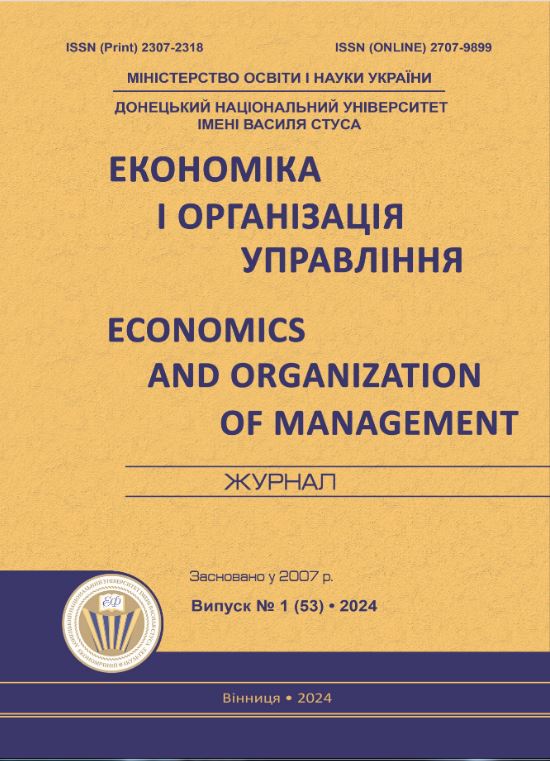The impact of geopolitical instability on international investment flows
DOI:
https://doi.org/10.31558/2307-2318.2024.1.9Keywords:
foreign direct investment, geopolitical instability, investment flow, war, investment climateAbstract
This article identifies the current impact of geopolitical instability on international investment flows. Thanks to the analysis of materials, main features and trends, the state of these processes was analyzed, possible consequences in the future and prospects were determined.
First of all, geopolitical risks such as war, sanctions and trade wars lead to volatility in financial markets, downgrades of countries' credit ratings and increased risks for investors. As a result, geopolitical tensions limit the movement of capital and payments, which can lead to the fragmentation of the global financial market. Investors are becoming more cautious and less willing to invest in countries with a high level of geopolitical risk.
The second aspect is that Russia's full-scale invasion of Ukraine is the main example of the aggravation of the geopolitical situation in the world. The impact of the war on the flow of foreign direct investment is taken into account, as it significantly affected the financial system. As a result of the economic recession, the revenues of the state and local budgets are decreasing, and defense expenditures are increasing. Economic recovery requires financing, which can be provided through business lending by commercial banks or raising capital through Ukraine's developed capital markets.
Analyzing these processes and thanks to the conducted analysis, a number of reasons for the decrease in the flow of foreign direct investments were determined, possible consequences in the future were formulated, and measures were determined that would help to avoid negative consequences and stabilize global investment activity.
References
Sheikh U. A., Asadi M., Roubaud D., HammoudehS.(2024). Global uncertainties and Australian financial markets: Quantiletime-frequencyconnectedness. InternationalReviewofFinancialAnalysis. Volume 92.URL: https://www.sciencedirect.com/science/article/abs/pii/S1057521924000309.
FiorilloP., MelesA., PellegrinoL. R., VerdolivaV.(2024).Geopoliticalriskandstockpricecrashrisk: The mitigating role of ESG performance. JournalofInternationalFinancialMarkets, Institutionsand Money. Volume91. URL: https://www.sciencedirect.com/science/article/pii/S105752192300474X.
FengCh., HanL., VigneS., XuY.(2023).Geopolitical risk and the dynamics of international capital flows. JournalofInternationalFinancialMarkets, Institutionsand Money. Volume 82.URL: https://www.sciencedirect.com/science/article/abs/pii/S1042443122001652.
Касянок К.Г. Міжнародні інвестиційні потоки в умовах глобальних фінансових дисбалансів. Економіка і суспільство. 2016. Випуск №3. С. 30-36.
Федорчук О.С., Чернова О.В. Міжнародні інвестиційні потоки: сучасний стан та тенденції розвитку. Глобальні та національні проблеми економіки. Електронне наукове фахове видання. 2015. Випуск 8. С. 90-93.
Шевченко Л. В. Фактори впливу на іноземне інвестування в економіку України: підходи до класифікації.Вісник Харківського національного університету імені В. Н. Каразіна серія «Економічна». 2021. Випуск 100.С. 57–65.
Звіт Світового банку про «Управління державними інвестиціями звіт про діагностичне оцінювання». URL: https://documents1.worldbank.org/
InternationalMonetaryFund. Global Financial Stability Report, April 2023 - Chapter 3: GeopoliticsandFinancialFragmentation: implicationsformacro-financialstability. URL: https://www.imf.org/
ЮНКТАД. Світовий інвестиційний звіт за 2023 рік. URL: https://unctad.org/publication/world-investment-report-2023
Національний банку України. URL: https://bank.gov.ua/
ЮНКТАД. Конференція ООН з торгівлі та розвитку. URL:https://unctadstat.unctad.org/EN/
TheFinancialStabilityImplicationsoftheWarinUkraine. URL: https://www.elibrary.imf.org/
Міністерство економіки України. Інвестиційна діяльність в Україні. URL: https://www.me.gov.ua/

